Covid hotspots: Switzerland’s situation worse than in most of Europe
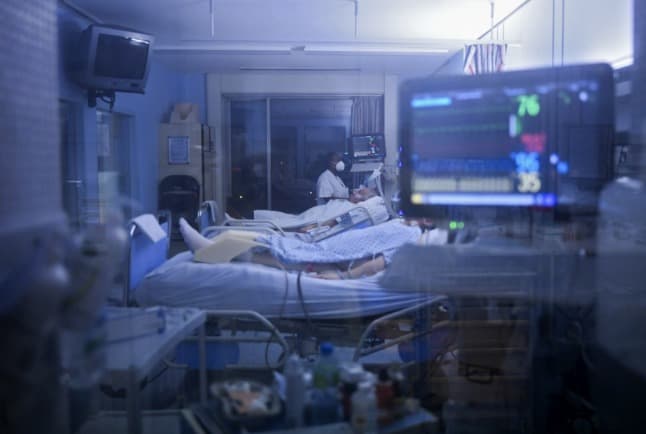
Christmas holidays are not looking very cheerful as Omicron variant runs rampant throughout Switzerland. This is what the epidemiological situation looks like for the last week of the year.
"The number of cases in Switzerland is higher than in practically all other European countries", according to Patrick Mathys, head of the crisis management section at the Federal Office of Public Health (FOPH) .
The continually worsening epidemiological situation is due to a combination of factors, experts say: the fast-spreading and highly contagious Omicron strain — which is usurping Delta to become a dominant Covid variant — as well as insufficient vaccination rate and slowness in administering booster shots.
In terms of new infections, the number fell down slightly in the past days to just over 8,000 new daily cases. However, it shot back up on Wednesday, when 11,562 new contaminations were reported.
As this FOPH map shows, Obwalden has the highest number of Covid cases — 2,639.73, for 100,000 residents, which is a double of the national rate of 1362,73.
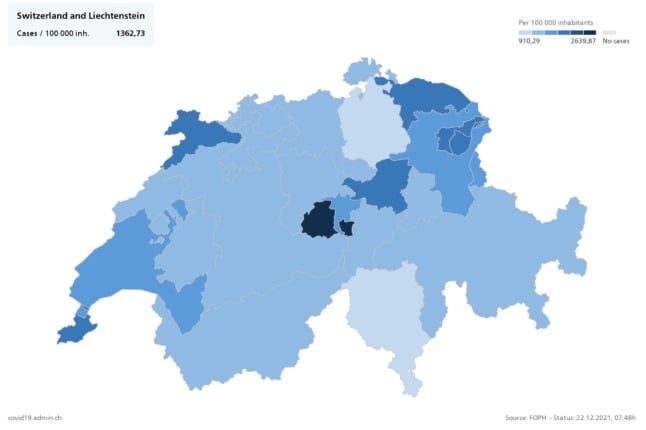
Other cantons that exceed this national average are the two Appenzells (1,994.76 / 100,000), Geneva (1,874.03), Thurgau (1,840, 87), Schwyz (1,811. 82), and Jura (1,804.39).
In addition to Geneva, Vaud’s rate is also above the national average, proving that pockets of infection have spread to the west of the country from their stronghold in the eastern and central regions of Switzerland.
The situation in the intensive care units is also worsening, as health officials have been warning for weeks.
READ MORE: Swiss ICUs at ‘highest capacity’ since Covid pandemic began
On December 21st, there were 313 Covid patients in Swiss ICUs, 24 more than two weeks prior.
FOPH had previously said that once the 300-mark is exceeded, triage may have to be put into place. So far, only a few triage cases have been reported, but a number of hospitals are cancelling non-urgent surgeries and treatments to invest all their medical resources into caring for coronavirus patients.
This map indicates where in Switzerland most Covid cases are hospitalised.
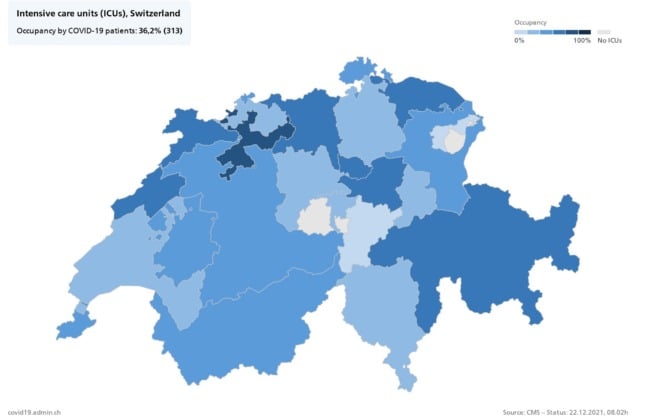
Most are in Solothurn, where coronavirus patients occupy 75 percent of ICU beds, followed by Thurgau (60.7 percent), and Schwyz (60 percent).
And the trend of unvaccinated people taking up most ICU resources is continuing, as this FOPH chart demonstrates.
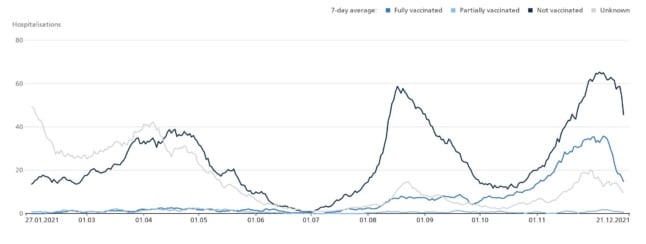
In terms of deaths, 310 people died of Covid between December 8th and December 21st, most of them in Bern (45), followed by (Aargau (38), Zurich (34) and Vaud (32).
READ MORE: Should vaccinated people have triage priority in Swiss hospitals?
As in the case of hospitalisations, most deaths were among the unvaccinated.
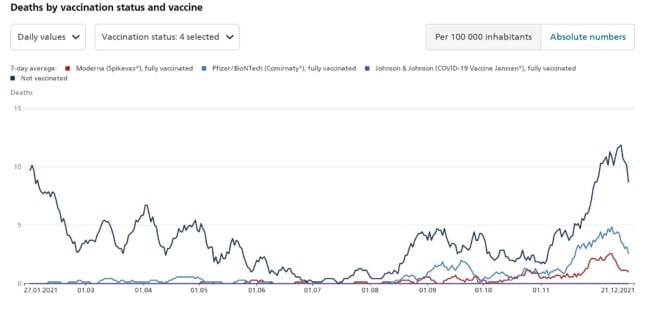
Image: FOPH
READ MORE: OPINION: Why has Switzerland been so slow in introducing new Covid measures?
Speaking of vaccinations, Switzerland continues to lag behind many other countries in terms of vaccinations which, according to health experts, is a major reason for the worsening epidemiological situation.
This chart shows how Switzerland compares with neighbour countries, as well as the UK and Portugal since the beginning of the vaccination campaign almost exactly a year ago.
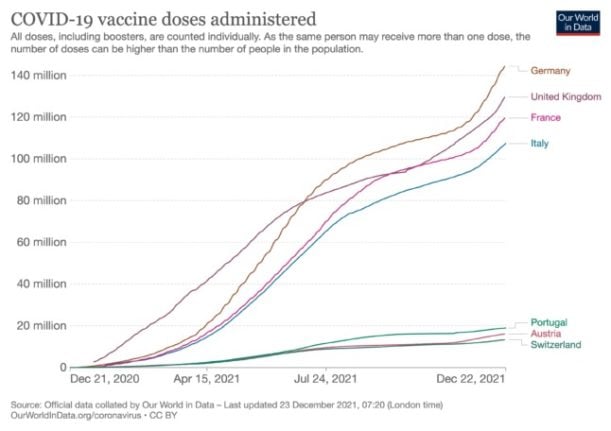
To date, 76.15 percent of all eligible people (ages 12 and up) are fully vaccinated, with less than a fourth — 22.47 percent — having received a booster shot.
In this respect too, Switzerland trails other countries, even though health officials say only a third dose offers at least a partial protection against Omicron.
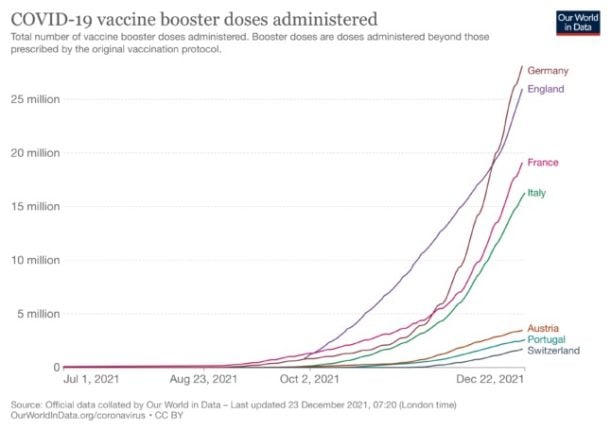
However, the country took a positive step on Tuesday by shortening its recommendation for booster shots from six to four months after the second dose.
READ MORE: Omicron: Switzerland shortens wait for booster vaccines to four months
Comments (1)
See Also
"The number of cases in Switzerland is higher than in practically all other European countries", according to Patrick Mathys, head of the crisis management section at the Federal Office of Public Health (FOPH) .
The continually worsening epidemiological situation is due to a combination of factors, experts say: the fast-spreading and highly contagious Omicron strain — which is usurping Delta to become a dominant Covid variant — as well as insufficient vaccination rate and slowness in administering booster shots.
In terms of new infections, the number fell down slightly in the past days to just over 8,000 new daily cases. However, it shot back up on Wednesday, when 11,562 new contaminations were reported.
As this FOPH map shows, Obwalden has the highest number of Covid cases — 2,639.73, for 100,000 residents, which is a double of the national rate of 1362,73.

Other cantons that exceed this national average are the two Appenzells (1,994.76 / 100,000), Geneva (1,874.03), Thurgau (1,840, 87), Schwyz (1,811. 82), and Jura (1,804.39).
In addition to Geneva, Vaud’s rate is also above the national average, proving that pockets of infection have spread to the west of the country from their stronghold in the eastern and central regions of Switzerland.
The situation in the intensive care units is also worsening, as health officials have been warning for weeks.
READ MORE: Swiss ICUs at ‘highest capacity’ since Covid pandemic began
On December 21st, there were 313 Covid patients in Swiss ICUs, 24 more than two weeks prior.
FOPH had previously said that once the 300-mark is exceeded, triage may have to be put into place. So far, only a few triage cases have been reported, but a number of hospitals are cancelling non-urgent surgeries and treatments to invest all their medical resources into caring for coronavirus patients.
This map indicates where in Switzerland most Covid cases are hospitalised.

Most are in Solothurn, where coronavirus patients occupy 75 percent of ICU beds, followed by Thurgau (60.7 percent), and Schwyz (60 percent).
And the trend of unvaccinated people taking up most ICU resources is continuing, as this FOPH chart demonstrates.

In terms of deaths, 310 people died of Covid between December 8th and December 21st, most of them in Bern (45), followed by (Aargau (38), Zurich (34) and Vaud (32).
READ MORE: Should vaccinated people have triage priority in Swiss hospitals?
As in the case of hospitalisations, most deaths were among the unvaccinated.

Image: FOPH
READ MORE: OPINION: Why has Switzerland been so slow in introducing new Covid measures?
Speaking of vaccinations, Switzerland continues to lag behind many other countries in terms of vaccinations which, according to health experts, is a major reason for the worsening epidemiological situation.
This chart shows how Switzerland compares with neighbour countries, as well as the UK and Portugal since the beginning of the vaccination campaign almost exactly a year ago.

To date, 76.15 percent of all eligible people (ages 12 and up) are fully vaccinated, with less than a fourth — 22.47 percent — having received a booster shot.
In this respect too, Switzerland trails other countries, even though health officials say only a third dose offers at least a partial protection against Omicron.

However, the country took a positive step on Tuesday by shortening its recommendation for booster shots from six to four months after the second dose.
READ MORE: Omicron: Switzerland shortens wait for booster vaccines to four months
Join the conversation in our comments section below. Share your own views and experience and if you have a question or suggestion for our journalists then email us at [email protected].
Please keep comments civil, constructive and on topic – and make sure to read our terms of use before getting involved.
Please log in here to leave a comment.